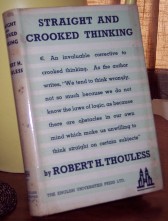In a post last December, the Argyleist (named as a featured blog on Technorati last night, which is how I happened to find this post — congrats, Argyleist!) raises the subject of faith:
I’m not necessarily talking about faith in a god specifically, but faith in anything. Believing in something without any real solid proof.
My take on this is that people err when they compartmentalize “faith” as exclusive to religion or spirituality, something that can’t be applied to the compartment that is governed by “proof.” So this morning, Todd Zywicki at The Volokh Conspiracy put up a post about The Ethical Brain, by Michael Gazzaniga, which has a chapter on religion, and writes:
One interesting point he makes in passing is that it turns out that scientists are just attached to their particular theories as religious believers, and in fact, scientists are just as reluctant to surrender their beliefs about science when confronted with contrary evidence as are religious believers.
Exactly.
The simple fact is that “faith” or “belief” is an intimate aspect of our cognitive experience. We like to claim that there are some things that are objectively “true” because they can be experientially proven, but that’s not the case — things we “know” will happen are actually just pretty solid guesses. To use a somewhat absurdist argument: the Earth has circled the sun every day for some 5 billion years. That doesn’t mean our beloved orb will rise daily in the east forever. Granted, it would be a waste of time to plan for a contingency in case the sun fails to make its appearance tomorrow. But that doesn’t mean that we aren’t taking morning on faith.
This all sounds too esoteric to be useful, and when it comes to the sun it probably is, but parse it out in the more intimate workings of our lives and we find it can be useful indeed. Faith “in the substance of things not seen” is the cognitive equivalent of walking, which as Laurie Anderson observed so smartly lo those many years ago is actually an act of falling:
You’re walking. And you don’t always realize it,
But you’re always falling.
With each step, you fall forward slightly.
And then catch yourself from falling.
Over and over, you’re falling.
And then catching yourself from falling.
And this is how you can be walking and falling
At the same time.
We can’t make a move without faith, so as I wrote last night, the real question is not “to believe or not to believe” so much as “where does my belief lead me?”

